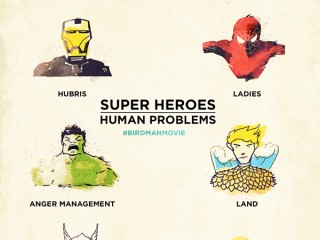While one can appreciate to-the-point thank you speeches, reminding us to “call your parents” and “thank your agent,” here are some of the 2015 Academy Award highlights in the context of unconventional ways of rocking the boat. Way to go!
 “Birdman,” which won four Oscars this year, also had the most stunning “for your consideration” website. While most of these kinds of sites provide screening information throughout award season, Birdman Backstage provides a great mise-en-scène of the film. Watson Design Group is behind the effort. Check out their social media “sharables” on Behance.
“Birdman,” which won four Oscars this year, also had the most stunning “for your consideration” website. While most of these kinds of sites provide screening information throughout award season, Birdman Backstage provides a great mise-en-scène of the film. Watson Design Group is behind the effort. Check out their social media “sharables” on Behance. “Ida,” which won Best Foreign Film — and is currently streaming on Netflix and iTunes, had its director, Pawel Pawlikowski, ignore the sound of the Academy orchestra prompting him to wrap up, right in the middle of thanking his cinematographer, and he just kept going through the music queue giving up. On that note, don’t miss a feature on the American Society of Cinematographers website with a thorough breakdown of technical notes and diagrams for three scenes shot by Lukaz Zal.
“Ida,” which won Best Foreign Film — and is currently streaming on Netflix and iTunes, had its director, Pawel Pawlikowski, ignore the sound of the Academy orchestra prompting him to wrap up, right in the middle of thanking his cinematographer, and he just kept going through the music queue giving up. On that note, don’t miss a feature on the American Society of Cinematographers website with a thorough breakdown of technical notes and diagrams for three scenes shot by Lukaz Zal. “The Grand Budapest Hotel,” which also won four Oscars this year, took Best Production Design. Part of their team was Simone de Salvatore, who did many matte paintings for the film at Moving Picture Company. See The Creators Project for an interview with the artist. Here’s one excerpt about using elements in balance, rather than over-doing it all one way or another:
“The Grand Budapest Hotel,” which also won four Oscars this year, took Best Production Design. Part of their team was Simone de Salvatore, who did many matte paintings for the film at Moving Picture Company. See The Creators Project for an interview with the artist. Here’s one excerpt about using elements in balance, rather than over-doing it all one way or another:
“For this movie I think [director Wes Anderson] brings his style to the next level but always keeping its magic untouched. In my opinion neither the only use of miniatures nor the creation of matte paintings alone made the difference, but the combination of the two. In most of the shots you won’t find a matte painting without a miniature and vice versa. Most of the time, when I was working on single shots, it was not easy to understand how this bizarre combination would work in the end, simply because you can’t see the big picture at that early stage, but after I watched the movie I was completely blown away, the final result had gone far over my expectations. I think he didn’t simply decide to give it a try with matte paintings, he knew exactly what he was doing and he knew that this choice would have affected his style in a way that to me looks magical.”
- Graham Moore, who won “Best Adapted Screenplay for “The Imitation Game,” ended his poignant speech with a pay-it-forward reminder for us all who think they don’t fit in:
“When I was 16 years old, I tried to kill myself. Because I felt weird and I felt different and I felt like I did not belong. And now I’m standing here and so, I would like for this moment to be for that kid out there that feels like she’s weird or she doesn’t fit in anywhere: yes, you do. I promise you do. You do. Stay weird. Stay different, and when it’s your turn and you are standing on this stage, please pass the same message to the next person who comes along.”
- Best Original Song went to “Glory” from the film “Selma,” where we heard from Lonnie Lynn and John Stephens — aka the real names for musicians Common and John Legend. They used their win as a platform for making a larger message on the current state of race relations:
“We wrote this song for a film that was based on events that were 50 years ago but we say that Selma is now, because the struggle for justice is right now. We know that the voting rights act that they fought for 50 years ago is being compromised now in this country today. Right now the struggle for freedom and justice is real.”
- “Citizenfour,” directed by Laura Poitras, won Best Documentary. Her speech touched upon the challenge and allure of investigative journalism:
“The disclosures that Edward Snowden reveals don’t only expose a threat to our privacy but to our democracy itself. When the most important decisions being made, affecting all of us, are made in secret, we lose our ability to check the powers that control. Thank you to Edward Snowden, for his courage, and for the many other whistleblowers. I share this with Glenn Greenwald and other journalists who are exposing truth.”
Right after the win, The New Yorker quickly published an opinion piece on “why “Citizenfour” deserved its Oscar,” which elaborates upon the two sides of the whistleblow / espionage debate that’s still going since the 2013 leak.
Did you have a favorite Oscar moment? Share your comment below.


Got something to add?